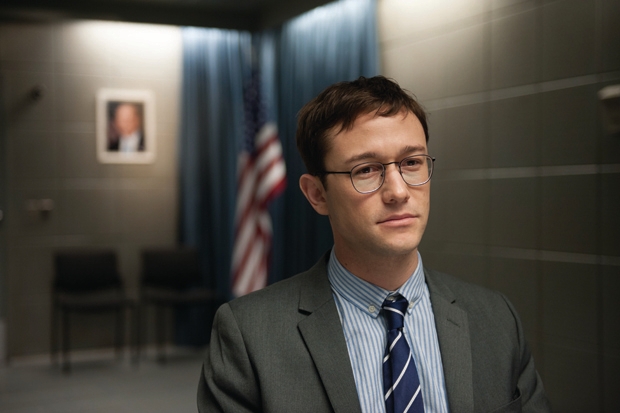If you were to see one film about American whistle-blower Edward Snowden — there is no law saying you have to, but if you were — then the film you want is probably Laura Poitras’s 2014 documentary Citizenfour rather than this biopic from Oliver Stone. It’s being sold as a ‘pulse-pounding thriller’ but oh, if only it were. Instead, it’s psychologically thin, tiresomely hagiographic and doesn’t answer any of the questions you’d like it to answer. Certainly, my pulse failed to oblige and if yours doesn’t behave similarly, I’d be most surprised.
Poitras’s film, which was a proper pulse-pounder, followed Snowden in real time as he was actually in the process of lifting the lid on the US government’s clandestine mass-surveillance programmes. Here, a dramatised version is used as the framing device, so the film begins with Poitras (Melissa Leo) and Guardian journalist Glenn Greenwald (Zachary Quinto) first meeting Snowden (Joseph Gordon-Levitt) at his Hong Kong hotel. The narrative then spools back to tell his story — how did he end up here? — which is fine, and as expected, but it never satisfies as the whole story.
We learn, for example, that he never finished high school, but not why. We learn, should you happen to wish for a further example, that his grandfather was in the Pentagon on 9/11, but not why. (I now know that glandular fever interrupted his education and that his grandfather was a rear admiral who later became a senior official with the FBI; there is a dark side to cyberspace, but Wikipedia is pretty useful.) Stone, who co-wrote the script, seems so certain that Snowden is a hero — he is portrayed as absolutely on the side of right at all times — that that’s all we need to know about him. Maybe he is a hero. I’m not saying he isn’t. But I’d like to make up my own mind.
We watch Snowden, who is a hacking genius — What? Where? When? — ascend within the CIA, but this Snowden is not a nuanced or complex Snowden. Neither is he the smart, compelling character from the Poitras film. This Snowden is flat and lacks both individuality and depth. So many of his fellow workers knew what he knew, but they did not turn. Why did he? What was it about him? This is not answered, along with much else, like what the hell Rhys Ifans is playing at. He stars as Snowden’s sinister CIA mentor but his performance is so hammily unconvincing it’s bizarre. Meanwhile, Nicolas Cage, who plays an eccentric code-cracking teacher, brings to the role what Nicolas Cage brings to every role these days: Nicolas Cage. It is most distracting, although that said, in the film’s final moments Alan Rusbridger plays Alan Rusbridger brilliantly. No quibbles there.
Snowden’s disillusionment grows. A colleague uses the webcam on an innocent Muslim woman’s own computer to watch her disrobe from burqa to panties. Snowden is appalled. But it’s not a journey as such. I wanted to understand the moment he decided to forfeit his own freedom; the moment he decided that stealing classified documents was worth more than his own life. But we never do understand that moment. Also, the film suffers from what films of this type generally suffer from. That is, it isn’t dramatically exciting because so much of the action — men sitting at laptops or gathering around screens as data pings — isn’t cinematic. There is big music, and there are big set-pieces in the various security agencies, but the meat of it drags.
If you are concerned about security and privacy matters, then you won’t learn anything new, and if you’re not, this won’t pull you in like, say, The Social Network, which interested you in a subject you didn’t know you could be interested in. And neither does it tell you why you should be interested. At one point Snowden has an argument with his girlfriend, Lindsay …sorry, forgot all about Lindsay (Shailene Woodley), probably because there’s no sexual chemistry between the two and she feels like padding. Anyway, they have this argument during which she says ‘nothing to hide, nothing to fear’ so he spits ‘bullshit!’ but doesn’t explain why. I was all for being convinced but this film doesn’t think it necessary even to try. And now it is almost Christmas and we’re busy and have better things to do, so in a nutshell: not a pulse-pounder, no.






Comments